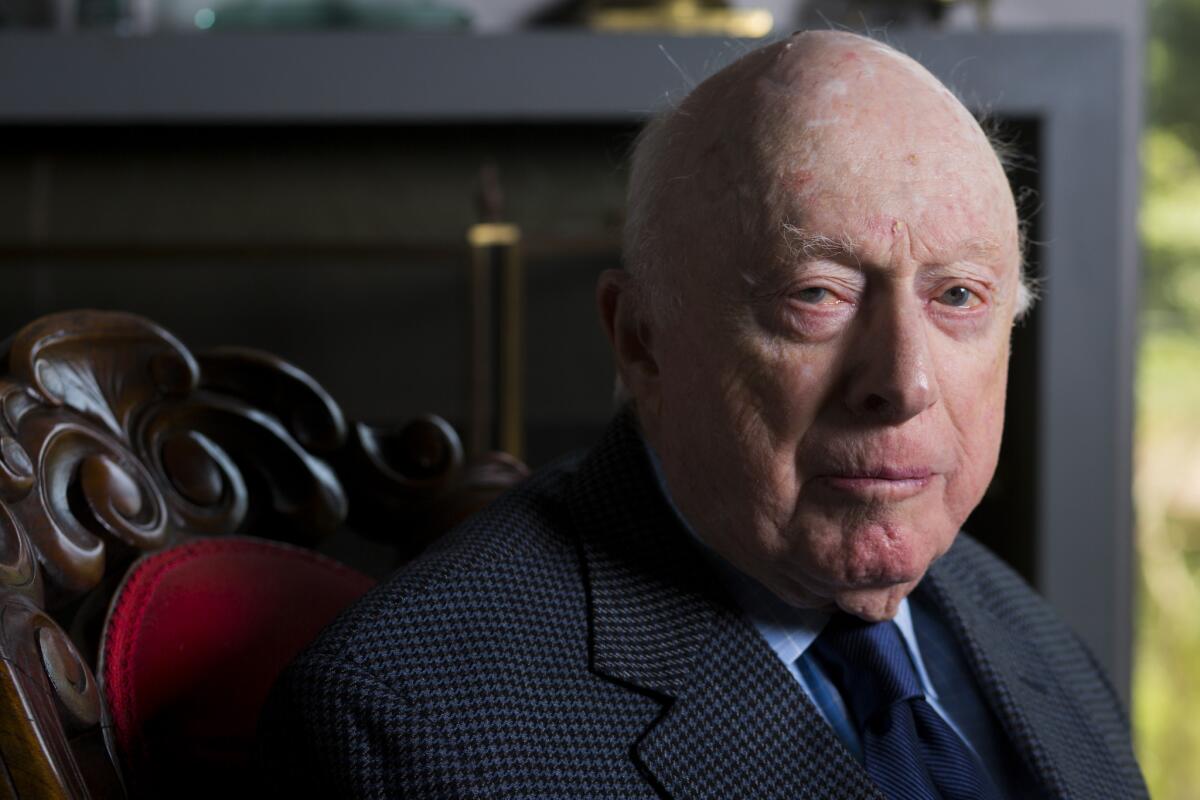UCLA honors the daring work of Norman Lloyd

- Share via
Even after nine decades as an actor, Norman Lloyd loves to perform — even if it’s for an audience of one.
During a recent interview, Lloyd was brandishing the cleaver used in “Man From the South,” the landmark 1960 episode of “Alfred Hitchcock Presents” starring Steve McQueen and Peter Lorre that Lloyd directed.
The ironically macabre tale revolves around a young gambler who makes a gruesome bet with an elderly man to win the man’s convertible. If the gambler’s lighter lights 10 times straight he will win the car, but if it doesn’t the man will cut the gambler’s pinkie finger off with a cleaver.
With cleaver in hand, Lloyd gleefully reenacted what he described as “one of the great moments in the history of film” — the expression of joy and then sadness that crept over Lorre’s face every time McQueen lighted the lighter. “He was great,” Lloyd said of Lorre as he rested the cleaver down on the small table in the living room of his Pacific Palisades home.
PHOTOS: Behind-the-scenes Classic Hollywood
“Man From the South” is screening during the UCLA Film & Television Archive’s retrospective “Stages: Norman Lloyd and American Television,” which begins April 18 and continues through June 8 at the Billy Wilder Theater. All the programs, culled from the UCLA TV collection, are free. Lloyd, who turns 100 in November, is scheduled to appear opening night.
The retrospective, programmed by the archive’s Paul Malcolm, is an astute selection of the accomplished, often daring work Lloyd did for TV as a producer and director.
In addition to “Man From the South,” the retrospective features several other of his directorial efforts, including the 1964 episode “The Jar” of “The Alfred Hitchcock Hour”; the first installment from 1952 of the “Omnibus” five-part biographical drama on Abraham Lincoln penned by James Agee; and “Carola,” a 1973 play telecast on PBS’ “Hollywood Television Theatre” — Lloyd was also a producer on the series.
Lloyd is a force of nature at age 99. He plays tennis twice a week, though he admits his game isn’t what it used to be. And he’s thrilled with the retrospective. “It’s an extraordinary compliment,” he said with an unabashed smile.
Lloyd’s had an extraordinary life personally — he was married for 75 years to Peggy, who died in 2011 — and professionally. Best known to audiences as the villain who falls off the Statue of Liberty in Hitchcock’s 1942 classic “Saboteur” and as the kindly Dr. Auschlander on the 1982-88 NBC series “St. Elsewhere,” Lloyd began as a child actor in the 1920s and appeared on Broadway with a young Orson Welles’ Mercury Theatre in the late 1930s.
Lloyd worked with some of the directors from the golden age of Hollywood, becoming good friends with many, including Charlie Chaplin (“Limelight”), French filmmaker Jean Renoir (“The Southerner”) and of course, Hitchcock.
PHOTOS: Celebrities by The Times
“I think by the time he started doing TV, he had such vast experience, working with those masters like Welles, Hitchcock and Renoir, he absorbed all of that,” said UCLA TV archivist Dan Einstein. “Of course he knew actors, and he knew acting. Three-quarters of directing is being able to work with actors.”
However, producers weren’t beating down Lloyd’s door in the 1950s because of the Hollywood blacklist. (Lloyd was a lifelong liberal who knew many in Hollywood’s left-wing community.) But that didn’t stop Hitchcock in 1957 from seeking him out to be the associate producer on “Alfred Hitchcock Presents.”
Lloyd noted that Hitchcock was told that “‘There is a problem with Norman Lloyd.’ He said three words — ‘I want him.’”
Lloyd was immediately hired to work alongside producer Joan Harrison, eventually becoming an executive producer on “The Alfred Hitchcock Hour,” which ended in 1965.
“While Hitchcock oversaw production, Lloyd and fellow producer Joan Harrison were largely responsible for the creative quality of that show,” said Mark Quigley, manager of research and study center for the archive. “Lloyd’s artistic sensibilities are incredibly sophisticated for a network TV series.”
Lloyd worked once again with Hitchcock on “Short Night,” a thriller the filmmaker was planning in the late 1970s. “Hitch, by the way, was not at his physical best. He was really getting old and had difficulty walking. We were working on the script one day and he says to me, ‘You know, Norm. We are not going to make this picture.”’
Lloyd was taken back. “I said, ‘Hitch. I don’t understand. Why do you say we are not going to make it?’ He said to me a classic line: ‘Because it’s not necessary.’ When he died, the Directors Guild asked me to write a tribute to him, which I did. That’s what I ended it with.”
---------------------------------------------------
‘Stages: Norman Lloyd and American Television’
UCLA Film & Television Archive
Billy Wilder Theater, 10899 Wilshire Blvd.
April 18 to June 8
Various times
Admission is free
For more information go to https://www.cinema.ucla.edu
More to Read
The biggest entertainment stories
Get our big stories about Hollywood, film, television, music, arts, culture and more right in your inbox as soon as they publish.
You may occasionally receive promotional content from the Los Angeles Times.











